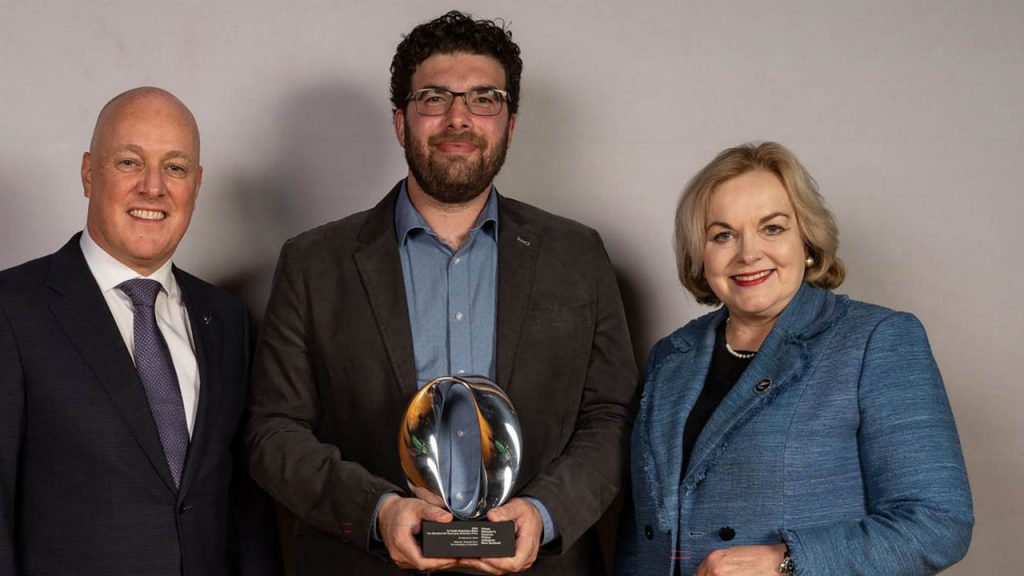Science
Cognitive Scientist Samuel Mehr Critiques New Zealand’s Science Funding

Cognitive scientist Samuel Mehr, a prominent figure in New Zealand’s scientific community, has issued a stark warning regarding the future of research in the country. One year after receiving New Zealand’s highest accolade in science, Mehr asserts that the current funding system is driving the nation’s top researchers abroad. He describes the existing financial support for science as “laughably pathetic” and warns that without substantial changes, New Zealand risks losing its reputation as a center for innovation.
Over the last decade, New Zealand has experienced significant shifts in its scientific landscape. According to Mehr, these changes, including recent restructures and budget cuts, have not only undermined research efforts but have also led to a “brain drain.” He notes that many of the country’s brightest minds are considering opportunities overseas, a trend that could have lasting implications for the nation’s scientific and economic future.
Mehr’s comments reflect a growing frustration among researchers who feel undervalued and underfunded. The cognitive scientist emphasizes that the current budgetary constraints are “insult to injury” for those who have dedicated their careers to advancing knowledge in their fields. He argues that adequate funding is essential not only for retaining talent but also for fostering an environment where innovation can thrive.
Impact of Funding Cuts on Research
The implications of insufficient funding are profound. Researchers often rely on financial support to conduct experiments, hire staff, and engage in collaborative projects. When resources are limited, the ability to attract and retain top talent diminishes. Mehr points out that many of his peers are now exploring opportunities in countries with more robust research funding systems, such as the United States and Australia, where investment in science and technology is prioritized.
As New Zealand grapples with these challenges, the need for a comprehensive review of its science funding model becomes increasingly urgent. The government has faced criticism for its handling of research budgets, with calls for a strategic approach that aligns funding with national priorities and the potential for economic growth through innovation.
Advocates for science funding argue that investing in research not only benefits the scientific community but also has far-reaching effects on society, including improved healthcare, environmental sustainability, and technological advancement.
Calls for Action from the Scientific Community
In light of the current situation, Mehr is urging policymakers to take immediate action to revitalize New Zealand’s science sector. He suggests that a commitment to increasing funding and supporting research initiatives could help restore the country’s standing as a leader in innovation.
The scientific community is rallying behind this call to action, with many researchers voicing their concerns about the future of their work and the potential consequences of continued underinvestment. The hope is that a renewed focus on science funding can not only keep talented individuals in New Zealand but also attract international researchers looking for collaborative opportunities.
As the debate over science funding continues, the future of New Zealand’s innovative landscape hangs in the balance. The decisions made in the coming months will be critical in determining whether the country can reclaim its position as a global hub for research and development.
-

 World3 months ago
World3 months agoTest Your Knowledge: Take the Herald’s Afternoon Quiz Today
-

 Sports3 months ago
Sports3 months agoPM Faces Backlash from Fans During Netball Trophy Ceremony
-

 Lifestyle3 months ago
Lifestyle3 months agoDunedin Designers Win Top Award at Hokonui Fashion Event
-

 Sports3 months ago
Sports3 months agoLiam Lawson Launches New Era for Racing Bulls with Strong Start
-

 Lifestyle3 months ago
Lifestyle3 months agoDisney Fan Reveals Dress Code Tips for Park Visitors
-

 Health3 months ago
Health3 months agoWalking Faster Offers Major Health Benefits for Older Adults
-

 World3 months ago
World3 months agoCoalition Forms to Preserve Māori Wards in Hawke’s Bay
-

 Politics3 months ago
Politics3 months agoScots Rally with Humor and Music to Protest Trump’s Visit
-

 Top Stories3 months ago
Top Stories3 months agoUK and India Finalize Trade Deal to Boost Economic Ties
-

 World3 months ago
World3 months agoHuntly Begins Water Pipe Flushing to Resolve Brown Water Issue
-

 Entertainment3 months ago
Entertainment3 months agoExperience the Excitement of ‘Chief of War’ in Oʻahu
-

 Science3 months ago
Science3 months agoNew Interactive Map Reveals Wairarapa Valley’s Geological Secrets









